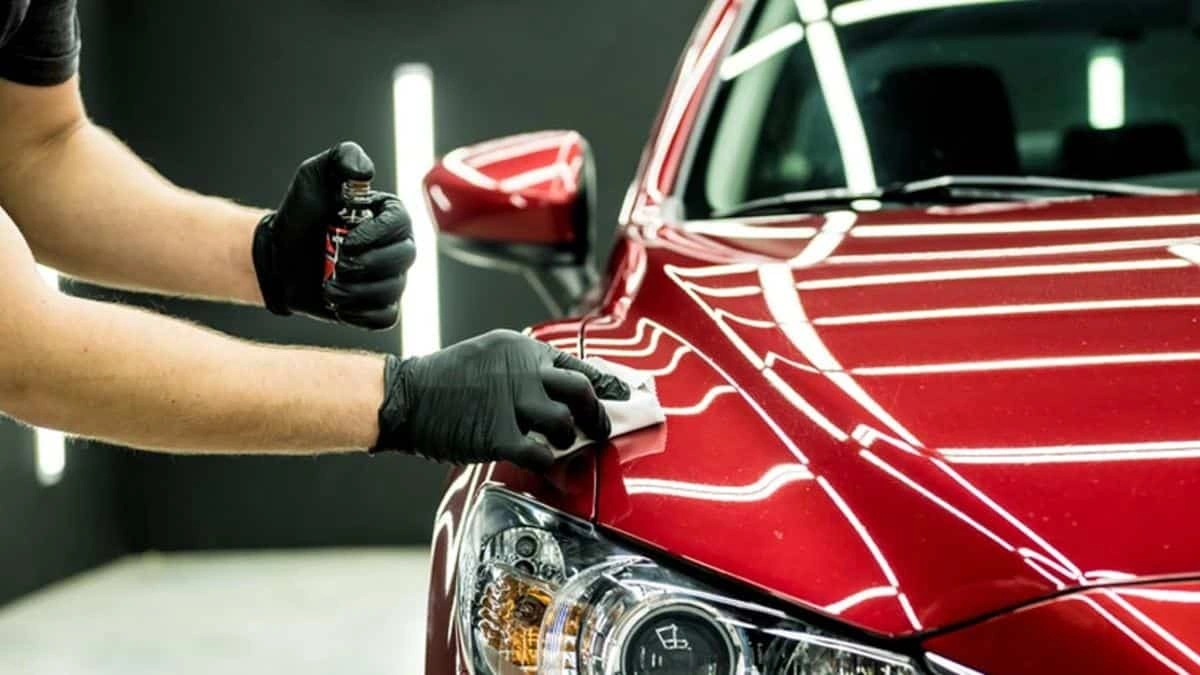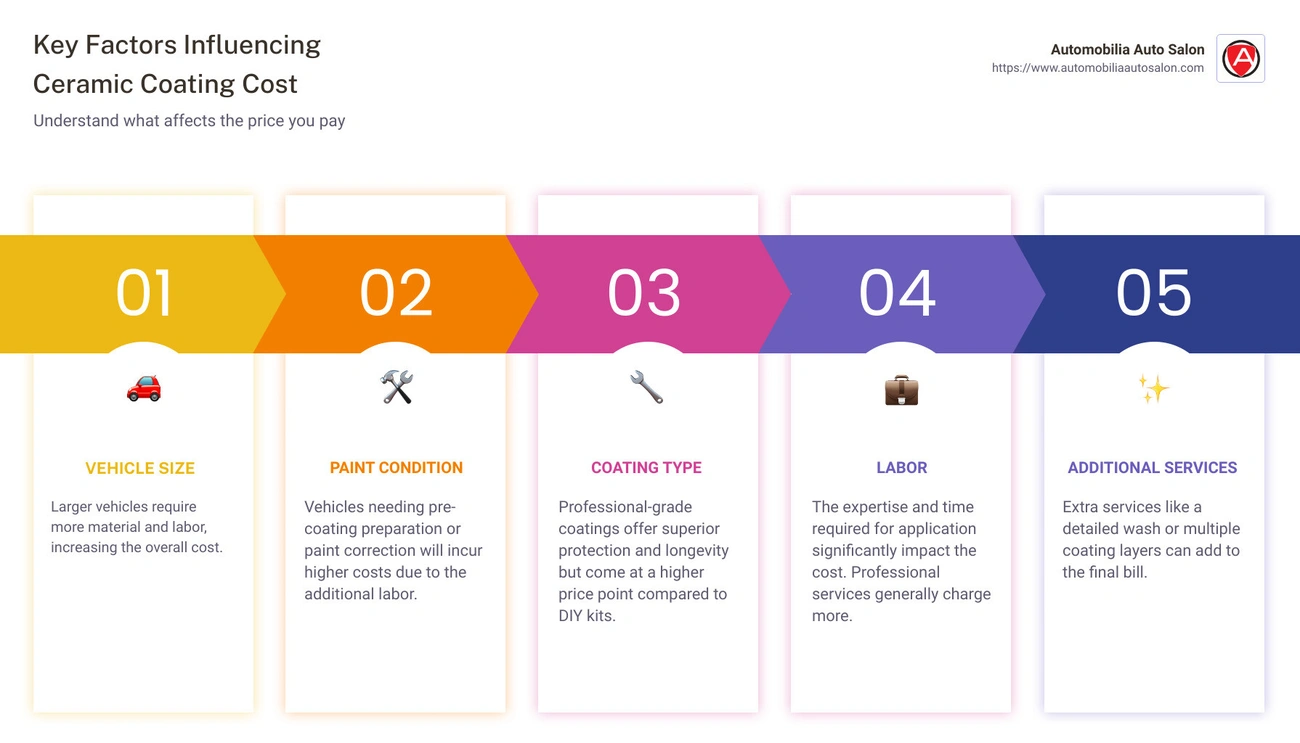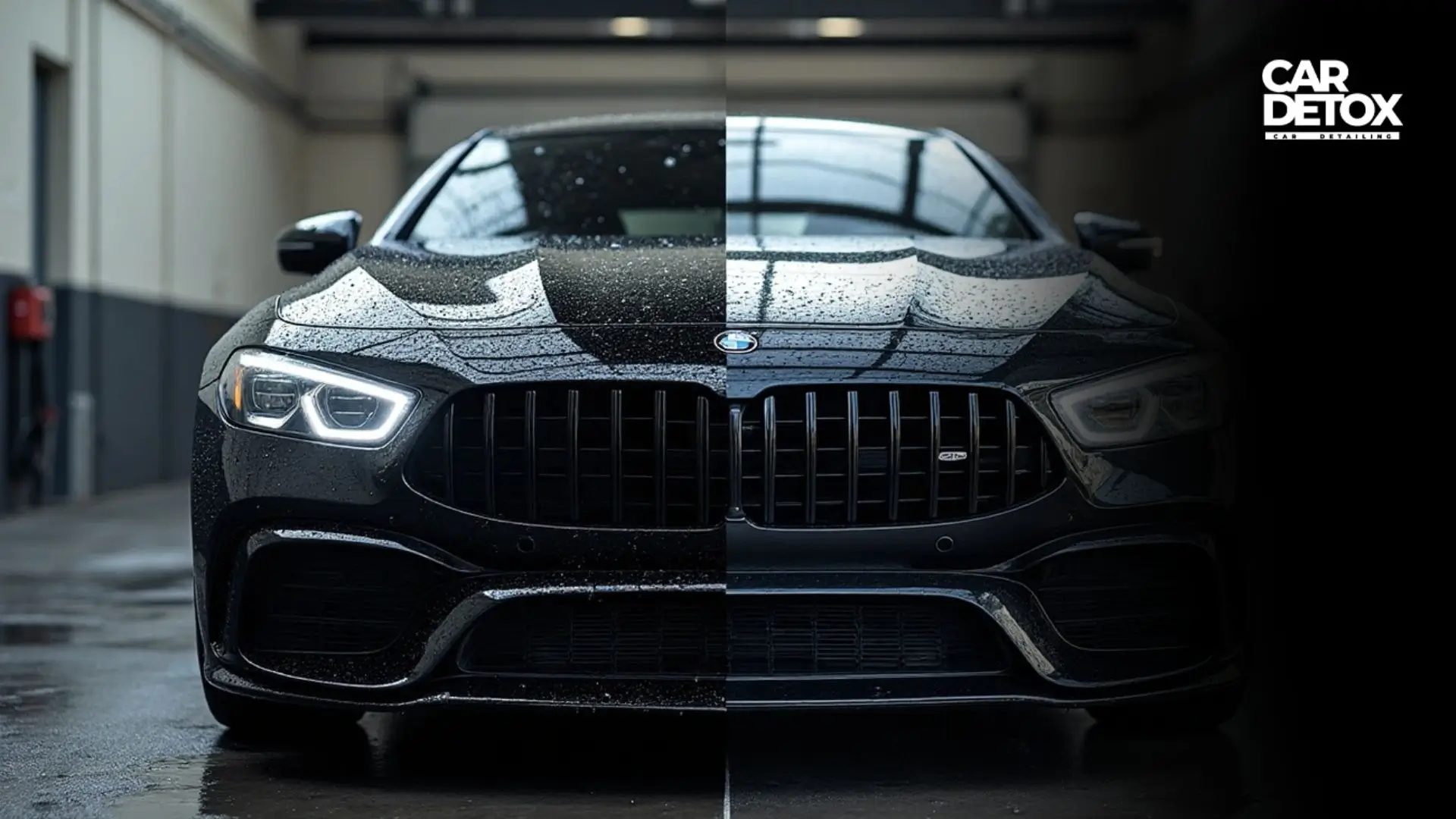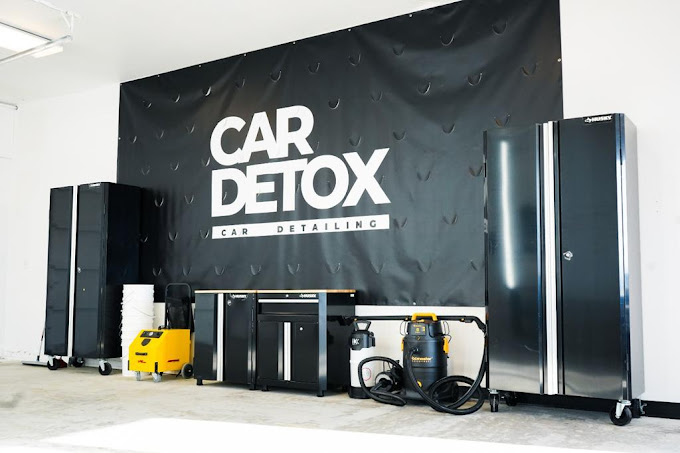Thinking about ceramic coating for your new car? You're not alone. Ceramic coating has become a game-changer in the automotive industry that provides exceptional protection for car exteriors and makes maintenance easier. Professional applications range from $800 to $2,500 based on your vehicle's size, and many new car owners question this investment's value.
Your decision to ceramic coat a fresh car is influenced by several things. UV radiation, environmental pollutants, and little scratches are shielded from your paint by the hard protective coating generated by coating. Your car is exceptionally simple to clean as water and filth just bead off the surface thanks to the hydrophobic qualities of the coating. Although a well-kept ceramic coating can last 2-5 years, ordinary waxing calls for reapplications every few months. Thinking over long-term vehicle protection will help one to make wise decisions.
By examining the advantages, expenses, and important elements influencing whether the ceramic coating is appropriate for your new vehicle, this article will help you realize its maximum potential. You will discover professional vs DIY possibilities when to apply the coating, and what you may reasonably expect from this investment.
What is Ceramic Coating and How Does It Work?

Ceramic coating stands as a breakthrough in automotive protection technology. Unlike other products, ceramic coating is a liquid polymer that contains silicon dioxide (SiO2) and sometimes titanium dioxide (TiO2). It creates a lasting bond with your vehicle's paint. This smart solution doesn't just cover your car's finish—it becomes part of it.
Creates a protective layer over factory paint
The ceramic coating bonds with your new car's factory paint at a molecular level. This goes beyond surface treatment and triggers a chemical reaction. Heat or UV light helps the liquid polymer cure. The polymer molecules link together and create a solid protective barrier. Your vehicle gets an invisible shield that becomes part of its exterior instead of just sitting on top.
The hardened ceramic layer fights off scratches, stains, and damage from the environment. This protective shell keeps your car's original paint safe by taking the hit from harmful elements.
Hydrophobic and UV-resistant properties
The ceramic coating's most eye-catching feature is how it repels water. The coating's molecular structure creates a very smooth surface that you can't see with your eyes. Water droplets can't stick to the surface. They form beads and roll off—just like water on a lotus leaf.
This water-beading effect looks great and serves a real purpose. It stops water spots and mineral deposits from showing up. The ceramic coating also blocks up to 99% of harmful UV rays. Your car's paint won't fade or turn yellow from sun damage.
Difference between wax and sealants
Ceramic coating beats traditional protection methods in many ways. It lasts much longer—while carnauba wax protects for weeks or months, quality ceramic coatings shield your vehicle for 2-5 years. This huge difference comes from how these products work.
Wax sits on top of your paint without any real connection. Ceramic coating meshes with your car's clear coat to form a stronger bond. The coating's hardness (rated 9H on the Wolff-Wilborn scale) guards better against small scratches and environmental damage.
You'll need more prep work and careful application than waxing. The long-lasting benefits make ceramic coating worth it for new car owners who want serious protection.
Is Ceramic Coating Worth It for a New Car?
New car owners often ask if their factory-fresh paint needs another layer of protection. The showroom finish looks perfect, so why bother? The answer becomes clear when you understand what ceramic coating can do beyond factory protection.
Protection from environmental damage
Ceramic coating's defensive capabilities make it truly valuable. Cars with ceramic coating show 70% less surface damage than uncoated vehicles. The coating creates a strong protective shield against threats that can quickly damage even new paint.
Your car gets a thick protective barrier that guards against bird droppings, tree sap, acid rain, and harsh chemicals. The coating blocks 99% of harmful UV rays that make paint oxidize and fade. Sun damage starts affecting your paint immediately after exposure.
Preserving showroom shine
Ceramic coating does more than protect - it makes your car look amazing. Research shows ceramic-coated cars are 30% glossier than those with traditional wax. The advanced formula makes your paint's color look more vibrant.
Most temporary solutions fade quickly, but ceramic coating keeps that "just drove off the lot" look for years. The hard shell preserves the deep, glossy finish that makes new cars turn heads. Ceramic coating is a great way to get a lasting visual impact if you want to keep that showroom quality.
Reducing long-term maintenance
The biggest advantage might be how much less maintenance you'll need. The unique hydrophobic properties let water, dust, dirt, and debris slide right off. This self-cleaning effect leads to:
- 30% fewer full detailing sessions needed over two years
- The much easier washing process
- No more frequent waxing every 3-6 months
You'll save time and money in the long run. The original investment pays off through fewer waxing, polishing, and paint correction needs. Your car stays cleaner between washes, so you won't need to clean it as often.
Cost vs Value: What You Should Know

You need to think about your financial investment in ceramic coating. The upfront costs versus long-term benefits will help you decide if this protection makes sense for your new vehicle.
Professional vs DIY ceramic coating costs
Professional ceramic coating services cost between $500 to $3000 based on your vehicle's size, condition, and coating quality. This price tag has:
- Complete paint correction
- Professional-grade coating application
- Controlled application environment
- Labor from certified technicians
- Detailed warranty coverage
DIY ceramic coating kits cost nowhere near as much—just $50 to $150. All the same, these savings might be misleading. The real DIY cost reaches $300-$500 once you add paint correction tools, polishing compounds, and proper application equipment. It also lacks warranties and takes a lot of your time.
How long does ceramic coating last?
Quality ceramic coatings protect your vehicle for 2-5 years. Three key factors decide how long it lasts:
- Application quality (professional work lasts longer)
- Maintenance practices (regular cleaning with the right products)
- Environmental exposure (harsh conditions reduce lifespan)
Top-quality, professional coatings can last 5-7 years if you maintain them properly. DIY options usually give you 1-2 years of protection. The first 2-3 weeks after application are crucial. This curing period plays a huge role in how durable your coating becomes.
Does ceramic coating increase resale value?
Cars with well-maintained ceramic coatings sell for more. This boost in value comes from:
- Better-looking exterior and paint quality
- Proof of professional application (shows you took care of the car)
- Less maintenance is needed for the next owner
Without a doubt, cars with ceramic coatings' glossy finish look more appealing on dealership lots. Therefore, the improved looks and protected paint give you an edge when selling. The coating also keeps your car looking new by reducing wear and tear, which helps you get a better price when you sell or trade-in.
Things to Consider Before You Decide
Getting ceramic coating for your new car needs more thought than just knowing what it is and the cost. Your situation plays a vital role in deciding if this investment makes sense for you.
How long do you plan to keep the car
The time you'll own your car remains the main factor in thinking about ceramic coating. Quality ceramic coatings usually last 2-5 years, and premium options might even protect your car for 7 years in the best conditions. Weekend vehicles and show cars benefit most from ceramic coating because it makes maintenance easier and boosts the shine.
The original investment might not be worth it if you lease or swap cars every 2-3 years. Ceramic coating proves most valuable for people who keep their cars longer than 5 years, as the protection pays off over time.
Your parking and driving environment
The environment where you keep and drive your car greatly affects how well the coating works and whether you need it. Cars that stay outside face tough conditions like UV rays, pollutants, and extreme weather that damage the paint faster. Ceramic coating gives vital protection in these cases.
The way you drive matters just as much. Daily commuters who deal with traffic, road salt, industrial fallout, and constant exposure to elements get great benefits from ceramic coating protection. Family vehicles that often face scratches from bikes, camping gear, or shopping carts might need more than just ceramic coating.
Maintenance expectations and effort
Ceramic coating lasts long but needs regular care. Good maintenance means:
- Washing every 1-3 weeks with pH-neutral shampoo
- Cleaning bird droppings right away
- Getting professional checks yearly to keep the warranty valid
Note that ceramic coatings need proper washing techniques—you'll have to use the two-bucket method with microfiber towels. You should also stay away from automatic car washes with harsh brushes that can damage the coating.
Understanding what maintenance involves helps you decide if you're ready to commit to the proper care routine. Your coating won't last as long as it should without consistent care, and you won't get the most from your investment.
FAQs
Q1. Is ceramic coating worth it for a new car?
Ceramic coating can be a worthwhile investment for new vehicles, especially if you plan to keep the vehicle long-term. It provides superior protection against environmental damage, preserves the exchange shine, and reduces long-term conservation needs. Still, the value depends on factors like your driving terrain and the ability to maintain the coating properly.
Q2. How long does a ceramic coating generally last?
A quality ceramic coating, when duly applied and maintained, can last between 2 and 5 times. Some decoration coatings may indeed extend protection up to 7 times under ideal conditions. Professional operations generally last longer than DIY ones.
Q3. What are the main advantages of ceramic coating over traditional wax?
The ceramic coating offers several advantages over traditional wax, including longer-lasting protection( times vs. months), superior resistance to environmental pollutants, enhanced hydrophobic properties, and better preservation. It also requires lower frequent reapplication compared to wax.
Q4. Does ceramic coating increase a vehicle’s resale value?
While not guaranteed, a well-maintained ceramic coating can potentially increase a car's resale value. It helps save the vehicle's external appearance, demonstrates careful power, and offers the coming proprietor reduced maintenance conditions. The lustrous finish achieved with ceramic coating can make the vehicle more appealing to the resale buyers.
Q5. What conservation is needed for a ceramic-coated car?
Despite its continuity, ceramic coating is not conservation-free. Proper care includes regular washing every 1- 3 weeks with pH-neutral soap, immediate junking of pollutants like raspberry feces, and periodic professional examinations. It's important to use proper washing methods and avoid automatic car washes with abrasive skirmishes to maintain the coating's effectiveness.
Final Thoughts on Ceramic Coating Your New Car
Ceramic coating is a great way to protect your new car. This advanced protection bonds with your vehicle's paint to create a hard, hydrophobic shield against environmental damage.
Your choice will depend on several factors. The length of time you'll keep your car is vital - you'll get the most value if you plan to own it for more than five years. It also helps if you drive in harsh conditions, as the coating's protective properties shine in these situations.
Professional application costs between $500-$3000, while DIY kits run $50-$150. That's a big difference. But professional coatings last longer and protect better. Many car owners see it as a long-term investment rather than an expense.
Even with its durability, the ceramic coating needs proper care. You'll need to wash your car with the right products and techniques to keep the coating in top shape. Skip this maintenance and even the best coating won't last.
Should you get a ceramic coating? It comes down to your situation, budget, and what you want. The coating makes sense if you need lasting protection, want your car to look better, and plan to keep it for years. However, you might want to look at other options, If you are selling soon or working with a tight budget. Note that ceramic coating will cover your car more but will not make it bulletproof. For professional ceramic coating application and long-lasting protection, visit Car Detox.
Our Popular Services
Car Detailing Services | Ceramic Coating Services | Pet Hair Removal Services | Mobile Auto Detail Services Happy Valley | Car Detailing Services in Tualatin
Find Us On Map
Car Detox - Auto Detailing Services
Book An Appointment
Read More on
How Long Do Interior Ceramic Coatings Last?
Is Ceramic Coating Better Than Wax?
How to Find the Best Ceramic Coating Installer Near Me
How long does ceramic coating take to cure?
Revive your ride anytime, anywhere
Schedule AppointmentQuestions? Call us now!






